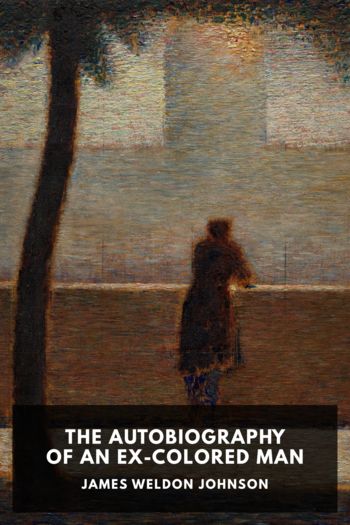The Autobiography of an Ex-Colored Man - James Weldon Johnson (best classic books of all time txt) 📗

- Author: James Weldon Johnson
Book online «The Autobiography of an Ex-Colored Man - James Weldon Johnson (best classic books of all time txt) 📗». Author James Weldon Johnson
I do not think it is claiming too much to say that Uncle Tom’s Cabin was a fair and truthful panorama of slavery; however that may be, it opened my eyes as to who and what I was and what my country considered me; in fact, it gave me my bearing. But there was no shock; I took the whole revelation in a kind of stoical way. One of the greatest benefits I derived from reading the book was that I could afterwards talk frankly with my mother on all the questions which had been vaguely troubling my mind. As a result, she was entirely freed from reserve, and often herself brought up the subject, talking of things directly touching her life and mine and of things which had come down to her through the “old folks.” What she told me interested and even fascinated me, and, what may seem strange, kindled in me a strong desire to see the South. She spoke to me quite frankly about herself, my father, and myself: she, the sewing girl of my father’s mother; he, an impetuous young man home from college; I, the child of this unsanctioned love. She told me even the principal reason for our coming north. My father was about to be married to a young lady of another great Southern family. She did not neglect to add that another reason for our being in Connecticut was that he intended to give me an education and make a man of me. In none of her talks did she ever utter one word of complaint against my father. She always endeavored to impress upon me how good he had been and still was, and that he was all to us that custom and the law would allow. She loved him; more, she worshiped him, and she died firmly believing that he loved her more than any other woman in the world. Perhaps she was right. Who knows?
All of these newly awakened ideas and thoughts took the form of a definite aspiration on the day I graduated from the grammar school. And what a day that was! The girls in white dresses, with fresh ribbons in their hair; the boys in new suits and creaky shoes; the great crowd of parents and friends; the flowers, the prizes and congratulations, made the day seem to me one of the greatest importance. I was on the program, and played a piano solo which was received by the audience with that amount of applause which I had come to look upon as being only the just due of my talent.
But the real enthusiasm was aroused by “Shiny.” He was the principal speaker of the day, and well did he measure up to the honor. He made a striking picture, that thin little black boy standing on the platform, dressed in clothes that did not fit him any too well, his eyes burning with excitement, his shrill, musical voice vibrating in tones of appealing defiance, and his black face alight with such great intelligence and earnestness as to be positively handsome. What were his thoughts when he stepped forward and looked into that crowd of faces, all white with the exception of a score or so that were lost to view? I do not know, but I fancy he felt his loneliness. I think there must have rushed over him a feeling akin to that of a gladiator tossed into the arena and bade to fight for his life. I think that solitary little black figure standing there felt that for the particular time and place he bore the weight and responsibility of his race; that for him to fail meant general defeat; but he won, and nobly. His oration was Wendell Phillips’s “Toussaint L’Ouverture,” a speech which may now be classed as rhetorical—even, perhaps, bombastic; but as the words fell from “Shiny’s” lips their effect was magical. How so young an orator could stir so great enthusiasm was to be wondered at. When, in the famous peroration, his voice, trembling with suppressed emotion, rose higher and higher and then rested on the name “Toussaint L’Ouverture,” it was like touching an electric button which loosed the pent-up feelings of his listeners. They actually rose to him.
I have since known of colored men who have been chosen as class orators in our leading universities, of others who have played on the varsity football and baseball teams, of colored speakers who have addressed great white audiences. In each of these instances I believe the men were stirred by the same emotions which actuated “Shiny” on the day of his graduation; and too, in each case where the efforts have reached any high standard of excellence they have been followed by the same phenomenon of enthusiasm. I think the explanation of the latter lies in what is a basic, though often dormant, principle of the Anglo-Saxon heart: love of fair play. “Shiny,” it is true, was what is so common in his race, a natural





Comments (0)